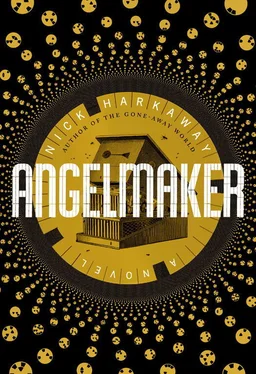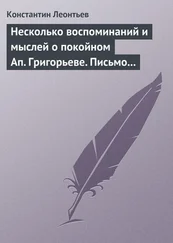Edie has stopped dead. The wooden practice blade is hovering halfway down. Mrs. Sekuni meets her eyes.
“Yes,” she says. “What we do here is very serious indeed. Again.”
This time, Edie does not stop. Mrs. Sekuni does not stop either, and her arms embrace, not the sword, but Edie’s own, and squeeze and turn, and Edie finds herself rotating and flying and landing on the ground, and now by some strange process Mrs. Sekuni controls the weapon, and Edie lies flat on her back, vulnerable in a way which is so total as to be very erotic. Mrs. Sekuni is locked along her, one knee on her chest and one hand on her face, the other on the hilt of the practice sword, which lies across Edie’s neck. Her eyes stare into Edie’s, brown and deep and very grave. They wear the traditional gi , a training suit, and Edie can smell sweat, wartime detergent, and something spiced and lingering which makes her mouth pucker. With a great effort of will, she does not glance down at the v-line of Mrs. Sekuni’s jacket. She can feel the pressure of one small, muscular breast against her.
Mrs. Sekuni grins wickedly, then releases Edie and rolls smoothly upright. The Sekunis have an unconventional approach to issues of marital fidelity owed to their conviction that more familiar understandings of love are the province of patriarchal totalitarianism. They also, to Edie’s considerable frustration, have a firm rule against sleeping with students.
Mrs. Sekuni’s tongue appears briefly as she taps her front teeth with it. Edie looks away.
“Why is it called ‘Yama Arashi’?”
“Possibly because uke hits the ground with a very loud bang,” Mrs. Sekuni suggests. “Learn it, Edie. Yama Arashi is very good budo . Difficult, because it contains many things within it. But very very good.” And then, looking over Edie’s shoulder, she claps her hand to her forehead in horror.
“Mr. Pritchard! What are you doing? Is that O-soto-gari ? No! It is not! It is a yak mating with a tractor! That is really very very not very good! My grandfather is weeping in Heaven, or he would be if there were such a place, which there is not because religion is a mystification contrived by monarchists! Again! Again, and this time do it properly!”
When Mrs. Sekuni is content with Edie’s combat skills, Mr. Sekuni begins teaching her about guns and explosives.
Edie knew that her training was at an end as soon as she saw the message ordering her “station side”—this being slang in Abel Jasmine’s organisation for the railway equivalent of dry land. She has a strange feeling in her legs, like a kind of inverted motion sickness; for the first time in weeks, she is standing on solid ground. She can smell bracken and earth, and on the wind, the unmistakable scent of heavy construction: hot metal and burned stone-dust.
In front of her is a rather grim Victorian manor or farm—if your idea of farming is waking at ten and walking along the hedges saying things like “I say, Jock, the wheat looks very fine this year, well done!”—made over into what she can only think of as a secret hideout. There is apparently also a secret greenhouse presumably filled with highly classified tomatoes.
On the other side of the manor, though, something else is taking shape; something the size of an aircraft hangar or a concert hall, with an earthen roof which resembles a hill or a burial mound and a great gawping maw of a doorway. Soon enough, Edie supposes, when the gorse grows back and the grass covers the works, the whole thing will look natural. Into the maw runs a row of railway sleepers without rails—yet—and this giveaway is being carefully painted green and brown, and broken with clever trompe l’oeil so that from the air it will look like nothing very much.
Some things, self-evidently, are either too big or too dangerous or too delicate to be done aboard a moving train, even a Ruskinite train with gas-baffle suspension and Brunel-Zeiss-Bauersfeld geodesic architecture, both of which the Ada Lovelace possesses and neither of which Edie even vaguely understands.
Edie ponders. The more aggressive aspect of Science 2 is called, prosaically, S2:Active, and is tasked with investigating and very occasionally implementing genuine scientific ideas which are probably completely impossible, but which, if confirmed, will reshape the world. If someone is going to invent a Gatling gun which can fire through solid steel, or an earthquake generator, or a heat-ray, or a devastating sonic cannon which causes tanks to shake themselves apart, Abel Jasmine is the man to ensure that fellow is working for the Crown and not the Axis.
Which brings up a question. “Is anyone doing anything like that?”
Abel Jasmine smiles. He did not announce himself, but Edie always knows when someone is behind her. This time she has also identified him, personally, and continued their conversation from the day before.
“Like what?”
“Superguns in space. Energy beams and lightning weapons.”
“Oh, yes. And not just that. This is a strange time, Miss Banister. The invisible world, it turns out, is considerably larger than the one we know. Men and women wrestle with intangibles and produce… well. Wonders and horrors. Such as the X-ray. A medical triumph. A miraculous thing. Except that direct exposure for too long rots the body like fire and plague. What’s the range? What’s the most powerful effect? Imagine a battlefield of invisible light, scorching from a mile away.”
Edie does, and doesn’t like it.
“Is that what all this is for?”
“No, Miss Banister. This is much more important. Come.” He gestures towards the manor house. A man is waiting for them on the step, an odd, elongated person in artificer’s black.
“Ruskinites,” Edie says, not without a measure of resignation.
It’s not that Edie has a problem with the Ruskinites, exactly. The Keeper—who turns out to be not only the designer of the Lovelace but also the top of the Ruskinite tree—is a nice enough person to be around, because his passion is so obvious and so entirely unthreatening. And, yes, she has some sympathy for the notion that all these perfectly reproduced, same same same objects which are gradually replacing the more awkward handmade things she grew up with may be in some way damaging her country’s relationship with itself, causing some kind of ghastly exile of the soul.
She just doesn’t trust people who take things on faith, and suspects that a uniform group which purports to celebrate uniqueness is leaving itself open to going what Miss Thomas would have called “a bit funny.”
She smiles as she reaches the manor.
“Hello,” the Ruskinite says. “I’m Mockley.”
“And what do you do?” Edie responds politely, because to a Ruskinite this is the most important question that can be asked.
“Welding, mostly. I’ve got a sort of gift for asymmetric joints which will experience extreme irregular shear. You have to get to know them a bit.” He waves his hand vaguely.
“Oh,” she says. “How wonderful.”
Mockley beams.
“Take us in, please, Mockley,” Abel Jasmine says.
Inside, the whole room is ringing. Edie can feel it in her chest, a wild, exultant creel of power. They’re cutting solid rock away, digging and burrowing down towards the sea caves below. There’s a glass oven (i.e. an oven for the preparation and blowing of glass, not an oven made of glass, although nothing would surprise her) and a furnace, a crucible, and several giant tubes or tanks whose function Edie cannot begin to guess. There are chemistry retorts and demijohns and vats and condensers and odd-looking gear which somehow resembles the code gear on the Lovelace but also looks a bit like a Jacquard loom. A wild hodgepodge, a scientific playground. Or, as Edie walks closer to the central pit, she realises she is wrong. Not a playground at all. A god’s forge, for the making of magic swords and talking sculptures and all the stuff of fairy tales.
Читать дальше









![Ник Харкуэй - Гномон [litres]](/books/400023/nik-harkuej-gnomon-litres-thumb.webp)




